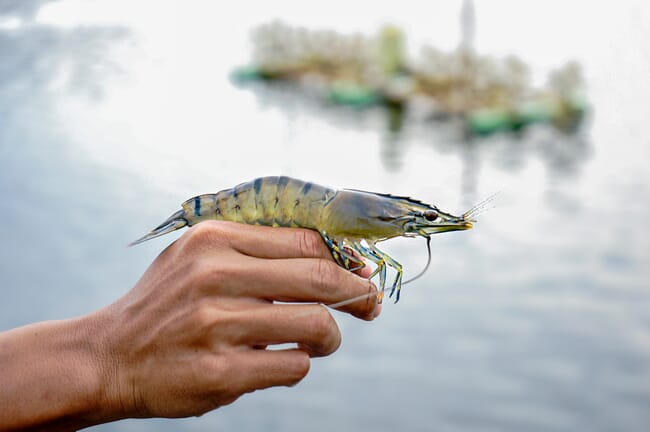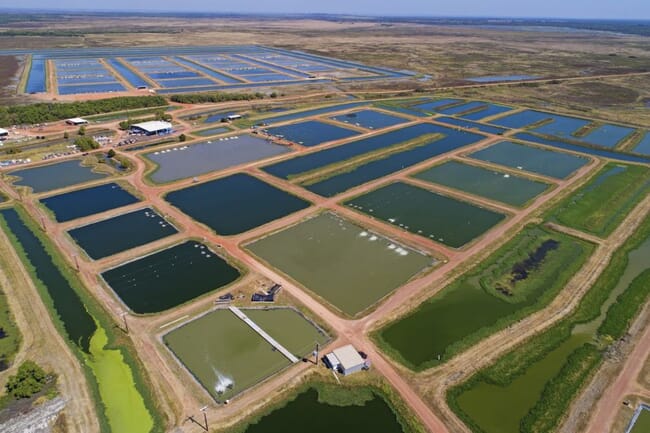
Ridley was able to reduce protein levels - and nitrogen levels later in the production cycle - by opting for a more sustianable aquafeed
Sustainable prawn production has significantly advanced with a commercial-scale trial showing a new diet with lower levels of protein can produce the same sized prawns with less impact on the environment.
Food typically fed to farmed prawns has a high protein level – made up of fish meal, fish oils and grain – to support good prawn growth. High protein diets have a higher nutrient output which the industry is seeking to address in its focus on more sustainable production methods.
The trial was run by Ridley – Australia’s largest commercial provider of high-performance animal nutrition – and Australian Prawn Farms, Ilbilbie, Queensland.
Prawns were fed the novel diet called Propel Grower which has 19.5 percent less protein than previous industry levels (37 vs 46 percent, respectively), and contains a unique microbial biomass ingredient called NovaqPro. NovaqPro was originally developed by CSIRO and commercialised by Ridley as part of a 12 year programme of research investment.
Ridley’s customer solutions manager for aquaculture Dr Richard Smullen says NovaqPro has been a key ingredient in allowing Ridley to reduce protein across its prawn diets by nearly 24 percent since 2019.
“The recent Australian Prawn Farm trial compared feeding a Propel Starter, and a Propel Grower diet, both containing NovaqPro, versus feeding a high-performing traditional Ridley programme. At the end of the growth cycle the ponds recorded an 8 percent better feed conversion, 10 percent better survival rates, and a 13 percent improvement in yield for the prawns fed the NovaqPro-containing feeds.”
“Put simply, there were greater numbers of prawns in the ponds when it came time to harvest. But most impressive of all was there was nearly a 40 percent reduction in nitrogen output for every tonne of prawns produced which is a big win for the environmental credentials of the farm,” Dr Smullen said.
Australian Prawn Farms general manager Matt West says the results were impressive and a significant step towards the ongoing sustainability of the industry.
“We found there was improved water quality and pond performance, as well as less environmental impact but more than that, we also saw prawns grow at the same rate and to the same size as those on a traditional diet containing higher levels of protein, fish meal and oil.”

The growth in aquaculture could see an increasing demand for marine resources, spurring the need for additional alternative raw materials © CSIRO
The results build on award winning farm-based research in 2020 to 2021 which demonstrated that the addition of NovaqPro and other proprietary ingredients, prawn diets could include significantly less fish meal and fish oil.
Dr Smullen said with the global growth in aquaculture could see an increasing demand for marine resources and this creates a need for additional alternative raw materials, and this research pre-empted a step change for industry.
“The research demonstrated the effectiveness of Ridley’s NovaqPro containing Propel diet with reduced fish meal and protein levels in commercial ponds, and with an industry focused on sustainable production, all major prawn farmers in Australia have begun feeding some level of the diet over the past season.”




